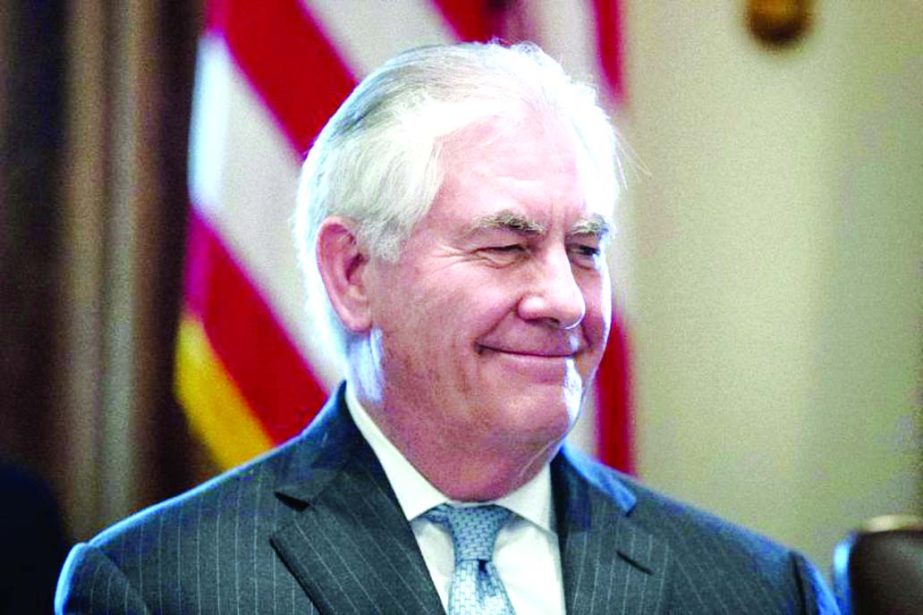
AP, Washington :
With Russia-tinged investigations swirling around his administration, President Donald Trump has yet to fulfill a campaign pledge of closer cooperation with Moscow. A planned trip by Secretary of State Rex Tillerson to Russia could test if detente proves anything more than talk.
In a move alarming U.S. allies, Tillerson plans to skip a meeting of NATO foreign ministers in Belgium next month, according to U.S. officials. The top American diplomat almost always attends such gatherings, and Tillerson will follow up his absence in Brussels by traveling to Russia’s capital shortly afterward.
The juxtaposition of the trips – one taken and one avoided – has reinforced concerns about America’s commitment to NATO, which Trump has repeatedly fueled by dressing down allies as deadbeats who aren’t paying enough for their own defense and who take U.S. help for granted.
Trump will take part in a meeting of NATO heads of state in Brussels on May 25, the White House announced Tuesday. Spokesman Sean Spicer said the president looks forward to discussing “issues critical to the alliance, especially allied responsibility-sharing and NATO’s role in the fight against terrorism.”
As far as the U.S-Russia relationship, Trump has yet to make any major steps as president to bring the two nations closer together.
As a candidate, Trump opened the door to potentially rolling back the sanctions imposed on Russia after its annexation of Ukraine’s Crimea region in 2014, a move Democrats and Republicans in Congress oppose. But as president, Trump has tamped down such suggestions as long as Russia fails to live up to its various commitments to end the fighting in Ukraine.
His administration also has resisted Russia’s calls to join forces against the Islamic State group in Syria, where the former Cold War foes have long backed opposing sides in a civil war. The Pentagon is continuing only what it calls U.S.-Russian “deconfliction” contacts, designed to ensure their forces don’t accidentally collide on Syria’s crowded battlefield and contested skies.
But Trump’s biggest roadblock to a new Russia approach may be the political realities at home.
In a remarkable public disclosure Monday, FBI Director James Comey said the bureau is investigating whether Trump campaign associates coordinated with Russian officials as Moscow sought to sway the U.S. presidential election. Several congressional committees are also investigating, ensuring the allegations of Russian meddling – and questions about Trump campaign collusion – stay in the spotlight for months to come.
With Russia-tinged investigations swirling around his administration, President Donald Trump has yet to fulfill a campaign pledge of closer cooperation with Moscow. A planned trip by Secretary of State Rex Tillerson to Russia could test if detente proves anything more than talk.
In a move alarming U.S. allies, Tillerson plans to skip a meeting of NATO foreign ministers in Belgium next month, according to U.S. officials. The top American diplomat almost always attends such gatherings, and Tillerson will follow up his absence in Brussels by traveling to Russia’s capital shortly afterward.
The juxtaposition of the trips – one taken and one avoided – has reinforced concerns about America’s commitment to NATO, which Trump has repeatedly fueled by dressing down allies as deadbeats who aren’t paying enough for their own defense and who take U.S. help for granted.
Trump will take part in a meeting of NATO heads of state in Brussels on May 25, the White House announced Tuesday. Spokesman Sean Spicer said the president looks forward to discussing “issues critical to the alliance, especially allied responsibility-sharing and NATO’s role in the fight against terrorism.”
As far as the U.S-Russia relationship, Trump has yet to make any major steps as president to bring the two nations closer together.
As a candidate, Trump opened the door to potentially rolling back the sanctions imposed on Russia after its annexation of Ukraine’s Crimea region in 2014, a move Democrats and Republicans in Congress oppose. But as president, Trump has tamped down such suggestions as long as Russia fails to live up to its various commitments to end the fighting in Ukraine.
His administration also has resisted Russia’s calls to join forces against the Islamic State group in Syria, where the former Cold War foes have long backed opposing sides in a civil war. The Pentagon is continuing only what it calls U.S.-Russian “deconfliction” contacts, designed to ensure their forces don’t accidentally collide on Syria’s crowded battlefield and contested skies.
But Trump’s biggest roadblock to a new Russia approach may be the political realities at home.
In a remarkable public disclosure Monday, FBI Director James Comey said the bureau is investigating whether Trump campaign associates coordinated with Russian officials as Moscow sought to sway the U.S. presidential election. Several congressional committees are also investigating, ensuring the allegations of Russian meddling – and questions about Trump campaign collusion – stay in the spotlight for months to come.

